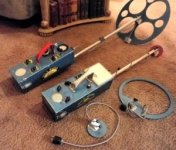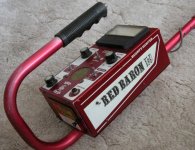So I mentioned to my 43 year old cousin that I had recently gotten into detecting. He told me that the last time he had even heard of anyone really detecting was back in the mid 70's when there was apparently a BIG metal detecting craze.
Was this the first big craze? I know modern detectors go back before that but was the 70's the first time people got out in big numbers?
When I am out detecting at parks in my area I always kind of tell myself that I am detecting in the footsteps of those that have detected before me...and yes their detectors my not have be as modern as mine but man-o-man they must have been finding the really rare stuff. The kind of things that would be very, very prized today.
So what was it like? Were people back in the 60's/70's finding barbers/seated etc coins left and right? Obviously silver was more plentiful back then and not worth as much as it is today but I would imagine that good finds would have been fairly steady for awhile. One can only imagine what it would have been like. Of course the target ID and discrimination wouldn't be as great.
This is from a website I found. Great info but I would like to hear from those that experienced it.
http://scottishdetecting.co.uk/tag/metal-detecting-tips/
In the 1970’s coils for detectors began to change and new designs came out, with each new design an improvement on its predecessor. The original induction balance system coils had 2 coils placed one on top of the other, and it was Compass Electronics that mounted the coils in a D shape set back to back, both of these coil systems had their fans. A major development of metal detectors was the ability to cancel out ground mineralisation, which meant that detectors could penetrate deeper into the ground. You could switch between this deep penetrating discriminative mode over to the non-discriminative mode manually. Later developments with mode switching lead to it being done electronically.
From the 70’s onwards there were a mass of developments in metal detecting, as new the technology was developed and improved; the new ever evolving micro-chip technology has possibly been one of the greatest boons to detecting technology. The induction balance detector was improved upon and lead to the motion detector being created. This was able to constantly able to check and adjust the detector for changes in background mineralisation. While this was being developed another great breakthrough was being worked on, the pulse induction system, which has the advantage of not being effected by background mineralisation and could even detect lost rings and other small finds in areas of heavy mineralisation. To begin with it had no discriminatory mode and many thought that it would be impossible to incorporate this into a pulse induction detector.
So for you guys that have been around for awhile what was it like?
Was this the first big craze? I know modern detectors go back before that but was the 70's the first time people got out in big numbers?
When I am out detecting at parks in my area I always kind of tell myself that I am detecting in the footsteps of those that have detected before me...and yes their detectors my not have be as modern as mine but man-o-man they must have been finding the really rare stuff. The kind of things that would be very, very prized today.
So what was it like? Were people back in the 60's/70's finding barbers/seated etc coins left and right? Obviously silver was more plentiful back then and not worth as much as it is today but I would imagine that good finds would have been fairly steady for awhile. One can only imagine what it would have been like. Of course the target ID and discrimination wouldn't be as great.
This is from a website I found. Great info but I would like to hear from those that experienced it.
http://scottishdetecting.co.uk/tag/metal-detecting-tips/
In the 1970’s coils for detectors began to change and new designs came out, with each new design an improvement on its predecessor. The original induction balance system coils had 2 coils placed one on top of the other, and it was Compass Electronics that mounted the coils in a D shape set back to back, both of these coil systems had their fans. A major development of metal detectors was the ability to cancel out ground mineralisation, which meant that detectors could penetrate deeper into the ground. You could switch between this deep penetrating discriminative mode over to the non-discriminative mode manually. Later developments with mode switching lead to it being done electronically.
From the 70’s onwards there were a mass of developments in metal detecting, as new the technology was developed and improved; the new ever evolving micro-chip technology has possibly been one of the greatest boons to detecting technology. The induction balance detector was improved upon and lead to the motion detector being created. This was able to constantly able to check and adjust the detector for changes in background mineralisation. While this was being developed another great breakthrough was being worked on, the pulse induction system, which has the advantage of not being effected by background mineralisation and could even detect lost rings and other small finds in areas of heavy mineralisation. To begin with it had no discriminatory mode and many thought that it would be impossible to incorporate this into a pulse induction detector.
So for you guys that have been around for awhile what was it like?






 I would add..."in the snow!"
I would add..."in the snow!"